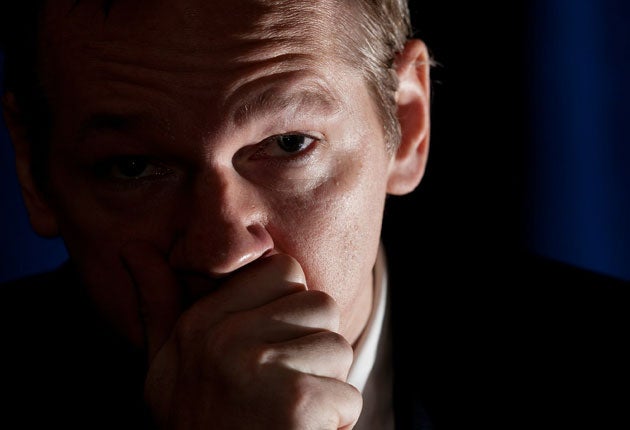Assange's collaborators get their knives out
The editors of 'The New York Times' and 'The Guardian' deliver their verdicts on life with the founder of WikiLeaks

WikiLeaks founder Julian Assange smelled "as if he hadn't bathed in days", suddenly skipped in the street like a child, and could be "elusive, manipulative and volatile". These are some of the claims about the head of the world's most controversial website made by journalists who have worked with him.
Bill Keller, the executive editor of The New York Times – one of a handful of newspapers that collaborated with the website in the publication of leaked documents last year – has detailed what he characterises as the 39-year-old's erratic appearance and behaviour. "He was alert but dishevelled, like a bag lady walking in off the street, wearing a dingy, light-coloured sport coat and cargo pants, dirty white shirt, beat-up sneakers and filthy white socks that collapsed around his ankles. He smelled as if he hadn't bathed in days," a reporter wrote to Keller.
In an e-book, Open Secrets: WikiLeaks, War and American Diplomacy, out tomorrow, Mr Keller says that Mr Assange had "a bit of Peter Pan in him". His behaviour included "freakish" shouting and breaking into a skip after dining with colleagues. "One night, when they were all walking down the street after dinner, Assange suddenly started skipping ahead of the group. Schmitt and Goetz [journalists for the New York Times and Spiegel] stared, speechless. Then, just as suddenly, Assange stopped, got back in step with them and returned to the conversation he had interrupted. The reporters came to think of Assange as smart and well educated, adept technologically but arrogant, thin-skinned, conspiratorial and oddly credulous."
Those working with WikiLeaks also suspected their email accounts had been hacked into following altercations with the website, according to Mr Keller. "At a point when relations between the news organisations and WikiLeaks were rocky, at least three people associated with this project had inexplicable activity in their email that suggested someone was hacking into their accounts."
Mr Assange is in the UK awaiting an extradition hearing next Monday over sexual assault charges in Sweden. A spokesman for WikiLeaks said Mr Assange would not comment on the criticisms, but the website posted on its Twitter account: "NYTimes does another self-serving smear. Facts wrong, top to bottom. Dark day for US journalism."
In what appears to be a co-ordinated release, all three of the publications that worked closely with WikiLeaks are putting out books tomorrow giving their versions of events. Along with the German magazine Der Spiegel and The Guardian in the UK, The New York Times gained early access to material held by WikiLeaks.
Judging from extracts published so far, the most critical book comes from writers at The New York Times, which fell out with Mr Assange in October after the publication of the Iraq War Diaries. Mr Assange claimed the paper didn't publish the material in its entirety and made too many concessions to the White House before going to print. His fury was not helped by a story the paper carried the day after the leaks, which criticised him and quoted many of his detractors. From that point on, Mr Assange wanted The New York Times kept out of the loop. When The Guardian later shared material with it, he threatened legal action.
Alan Rusbridger, the editor of The Guardian, corroborates Mr Keller's account of Mr Assange's erratic behaviour: "It was never entirely clear which timezone he was in. The difference between day and night, an important consideration in most lives, seemed of little interest to him." In a foreword to his paper's book, Mr Rusbridger added: "Few people seem to find Assange an easy man with whom to collaborate. We certainly had our moments of difficulty and tension."
Both Mr Rusbridger and Mr Keller said he seemed almost fictional. "I came to think of Julian Assange as a character from a Stieg Larsson thriller – a man who could figure either as hero or villain in one of the mega-selling Swedish novels that mix hacker counterculture, high-level conspiracy and sex as both recreation and violation," Mr Keller wrote. Extracts published so far suggest writers from Der Spiegel have been less critical. The opening to Staatsfeind WikiLeaks (WikiLeaks: Public Enemy No 1) by editors Marcel Rosenbach and Holger Stark focuses instead on the wine-fuelled negotiations at The Guardian that kept the deal in place.
Meanwhile, in an interview with US television programme 60 Minutes, Mr Assange says he enjoys making banks squirm thinking they might be the next targets of his website which has published US diplomatic and military secrets. CBS interviewer Steve Kroft asked Mr Assange whether he had acquired a five-gigabyte hard drive belonging to one of the bank's executives, as he had previously asserted. "I won't make any comment in relation to that upcoming publication," he said. He had previously said that WikiLeaks planned a "megaleak" of tens of thousands of internal documents from a major US bank in early 2011.
Join our commenting forum
Join thought-provoking conversations, follow other Independent readers and see their replies
Comments
Bookmark popover
Removed from bookmarks